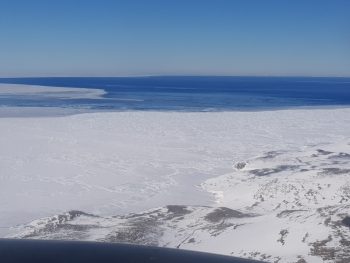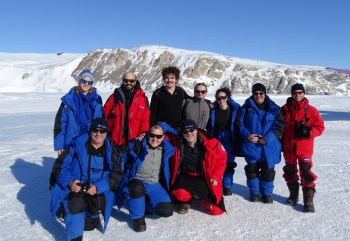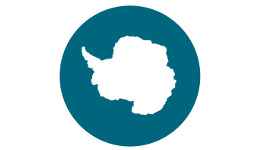Dr. Carmen Possnig is the ESA-sponsored medical doctor spending 12 months at Concordia research station in Antarctica. She facilitates a number of experiments on the effects of isolation, light deprivation, and extreme temperatures on the human body and mind. In the following post, Carmen talks about the arrival to the station.

Here at last. Credits: IPEV/PNRA–R. Bras
We meet our Italian colleagues in Christchurch, New Zealand. At a pleasant 18°C we go to the International Antarctic Center for safety and survival training before our next flight into the cold.
They put us in front of a crate with the emergency equipment. A safety guy tells us what to do if we land or crash somewhere in the snow:
-What do I always have to carry with me so I don’t get cold? (a return ticket to New Zealand?)
-How do I build an igloo? (he shows us his favourite shovel)
-What do I use to make food? (Snow. Primarily snow. And fuel from the plane. Or something.)
-How do I pull the others out of the crevasses? (with your hands! Among other things.)
The next flight goes to Mario Zucchelli, the Italian summer station on the coast, overlooking Mount Melbourne, in Terra Nova Bay. A robust looking cargo plane takes us there.
When the Antarctic coast first appears on the horizon, it gets quiet on the plane – primarily because of the earplugs, then because most people fell asleep – but also because the rest of us gather in front of the few windows and stare, mesmerized, into the wide white distance.
After a night in Mario Zucchelli, we continue towards the centre of the continent. Flying over the East Antarctic we see fascinating mountain landscapes, which soon give way to seemingly endless ice fields with bizarre snow formations: the Antarctic plateau, the East Antarctic, the coldest area this planet has to offer. Our new home.
At some point the window freezes (from the inside) and you can only see something for about 40 seconds – after you have scratched the ice with one of the mini-Nutella packages.

First contact with the Antarctic pack ice. Credits: ESA/IPEV/PNRA–A. Razeto
We land very gently, and suddenly we stand on Dome C for the first time.
The first step on the snow is a strange feeling. It feels different from the snow at home, my boots make a dry-squeaky noise and the -37°C makes my nose hair freeze.
Suddenly we are surrounded by people who know our names and embrace us happily, take pictures and take our luggage out of our hands.
The few stairs to the entrance of the station are surprisingly exhausting (hello, 3800m!), and shortly afterwards we all sit in thermo underwear in the living room with a cup of tea in our hands. Welcome to Concordia.
To read Carmen’s adventures at Concordia in German, see her personal blog.




Discussion: no comments